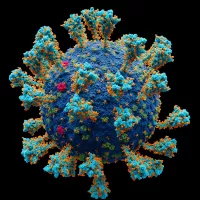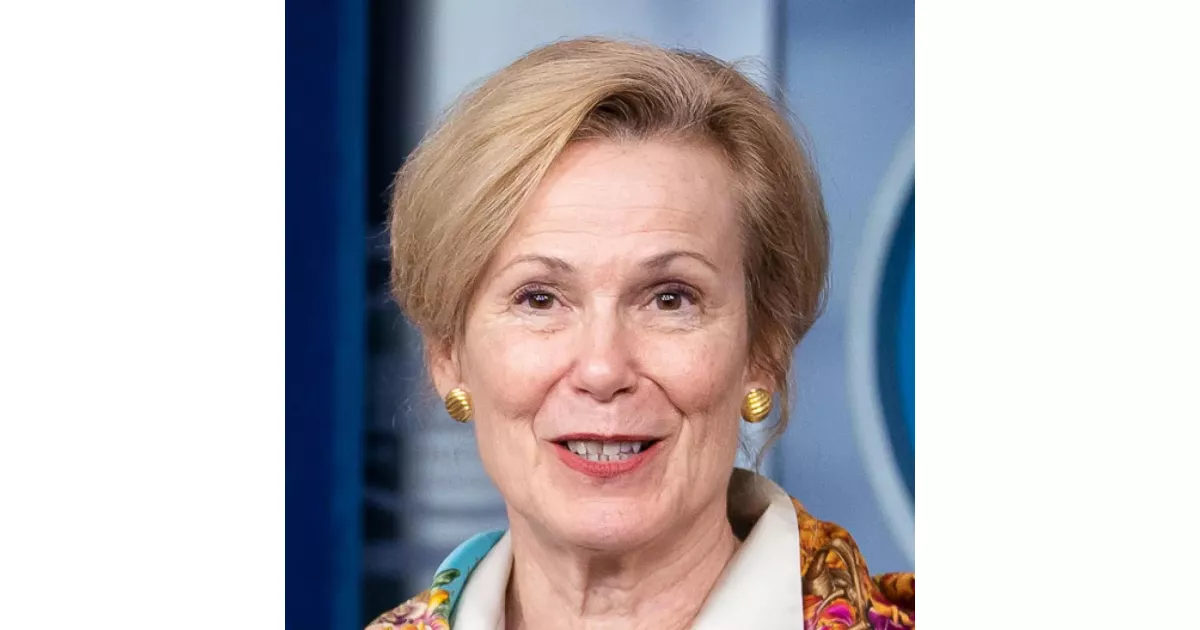Deborah Leah Birx is an American physician and diplomat known for her work in HIV/AIDS immunology, vaccine research, and global health. She served as the United States global AIDS coordinator under both Presidents Obama and Trump, overseeing the PEPFAR program that supports HIV/AIDS treatment and prevention in numerous countries. From 2020 to 2021, Birx held a prominent role as the White House Coronavirus Response Coordinator during the Trump administration. Following this, she joined ActivePure Technology as Chief Medical and Science Advisor in 2021.
April 4, 1956: Birth of Deborah Birx
Deborah Leah Birx was born on April 4, 1956.
1976: Marriage and Undergraduate Degree
While attending Hershey Medical School in 1976, Birx married Bryan Dudley Raybuck, a fellow medical student she met at Houghton University. She also obtained a Bachelor of Science degree in chemistry, completing her undergraduate studies in just two years.
1980: Medical Degree Awarded
Birx earned her Doctor of Medicine degree from the Penn State Milton S. Hershey Medical Center in 1980.
1980: Start of Career at Walter Reed Army Medical Center
Deborah Birx embarked on her career as a physician at Walter Reed Army Medical Center in 1980.
1980: Beginning of Military Service
Deborah Birx's service in the United States Army began in 1980 as an active duty reserve officer.
1981: Completion of Internship and Residency
In 1981, Birx successfully completed a one-year internship followed by a two-year residency in internal medicine.
1983: Start of Fellowships in Clinical Immunology
Deborah Birx pursued further specialization with two fellowships in clinical immunology, focusing on allergies and diagnostics, commencing in 1983.
1985: Assistant Chief at Walter Reed
Deborah Birx was appointed as the assistant chief of the Walter Reed Allergy/Immunology Service in 1985.
1986: Completion of Fellowships and Focus on HIV/AIDS Research
By 1986, Birx had completed her fellowships in clinical immunology and transitioned her focus to HIV/AIDS vaccine research.
1986: Research at National Institutes of Health
In 1986, Birx began working as an investigator at the National Institutes of Health, specializing in cellular immunology.
1989: Transition from Walter Reed to NIH
After nine years at Walter Reed Army Medical Center, Birx moved on to the National Institutes of Health to continue her research in 1989.
1989: Return to Walter Reed and Focus on Retroviral Research
Birx rejoined Walter Reed in 1989, working in the Department of Retroviral Research, marking her return to the institution where she started her career.
1989: Conclusion of Research at NIH
Deborah Birx finished her work as an investigator specializing in cellular immunology at the National Institutes of Health in 1989.
1994: Transition to Active Duty Army
In 1994, Birx transitioned to active duty regular Army from her previous reserve officer status.
1995: Transition to HIV-1 Vaccine Development
In 1995, Birx shifted her focus within Walter Reed to lead HIV-1 Vaccine Development as lab director.
1996: Leadership in Military HIV Research
Taking on a pivotal role, Birx became the director of the United States Military HIV Research Program at the Walter Reed Army Institute of Research in 1996.
2005: Leading CDC's Division of Global HIV/AIDS
Birx began her role as director of the Centers for Disease Control and Prevention's Division of Global HIV/AIDS in 2005.
2005: Conclusion of Leadership at Walter Reed
Deborah Birx concluded her nine-year tenure as the director of the United States Military HIV Research Program at the Walter Reed Army Institute of Research in 2005.
2008: Conclusion of Active Military Service
Deborah Birx concluded her active duty in the regular Army in 2008, having achieved the rank of Colonel.
January 2014: Nomination as Ambassador-at-Large and U.S. Global AIDS Coordinator
President Barack Obama nominated Deborah Birx for the position of Ambassador-at-Large and U.S. Global AIDS Coordinator in January 2014.
April 2, 2014: Senate Confirmation and Oath of Office
Deborah Birx was confirmed by the Senate on April 2, 2014, and was sworn in two days later.
2014: Leadership in Global HIV/AIDS Response
Deborah Birx began overseeing the implementation of PEPFAR and served as the United States global AIDS coordinator in 2014.
2014: End of Tenure at CDC's Division of Global HIV/AIDS
Deborah Birx's time as the director of the Centers for Disease Control and Prevention's Division of Global HIV/AIDS came to an end in 2014.
2015: Setting Targets for Ending the AIDS Epidemic
Birx played a key role in setting targets to end the AIDS epidemic by 2030, reflecting her dedication to global health issues.
2015: Appointment as U.S. Special Representative for Global Health Diplomacy and Setting Ambitious HIV/AIDS Goals
In 2015, Birx took on the role of U.S. Special Representative for Global Health Diplomacy and aimed to contribute to ending the AIDS epidemic by 2030.
February 2020: Appointment to the White House Coronavirus Task Force and Scrutiny of PEPFAR Management
In February 2020, Birx joined the White House Coronavirus Task Force and faced scrutiny for her management style at PEPFAR, described as "dictatorial" in a State Department audit.
February 2020: Scrutiny of PEPFAR Leadership
The management of PEPFAR under Birx's leadership came under scrutiny in February 2020 due to an audit that described her leadership style as "dictatorial."
February 27, 2020: Appointment as White House Coronavirus Response Coordinator
Deborah Birx was appointed to the position of White House Coronavirus Response Coordinator on February 27, 2020, by Vice President Pence.
March 2020: Joining the Global Fund Board
Deborah Birx joined the board of the Global Fund to Fight AIDS, Tuberculosis and Malaria in March 2020.
March 26, 2020: Reassurances about Healthcare Capacity
During a press conference on March 26, 2020, Birx reassured Americans that the United States had sufficient healthcare capacity, stating that there was no evidence to suggest otherwise.
April 16, 2020: Presentation of Reopening Plan
On April 16, 2020, a reopening plan, developed under Birx's leadership, was presented by President Trump, outlining voluntary standards for states to ease coronavirus lockdowns.
May 3, 2020: Advocating for Continued Precautions
As states began reopening, Birx continued to advocate for precautions against the virus on May 3, 2020, emphasizing the importance of social distancing.
July 2020: Directing COVID-19 Data to HHS Database
In July 2020, a working group led by Birx instructed hospitals to send all COVID-19 patient data to a Department of Health and Human Services database instead of the CDC, raising concerns among some health experts.
August 2, 2020: Recommendations for Mask-Wearing at Home
On August 2, 2020, Birx recommended that individuals living with vulnerable individuals consider wearing masks at home due to the widespread nature of the coronavirus.
August 10, 2020: Arrival of Scott Atlas and Birx's Focus on Local Outreach
After Scott Atlas joined the White House as President Trump's primary COVID-19 advisor on August 10, 2020, Birx shifted her focus to working directly with state and local officials on implementing mask mandates and social distancing guidelines.
October 2020: Expressing Hope for Election Outcome
While in Minnesota in October 2020, Birx shared her hope for a specific outcome in the upcoming presidential election with Andy Slavitt.
November 2020: Internal Report on Pandemic Response
In November 2020, Deborah Birx authored an internal report emphasizing the urgent need for the Administration to advocate for mask wearing, physical distancing, and avoiding gatherings. The report highlighted the necessity of an aggressive, balanced approach to combat the emerging wave of the pandemic, which, according to Birx, was not being implemented.
December 2020: Announcement of Impending Retirement
In December 2020, Birx announced her intention to retire from government shortly after Joe Biden's assumption of office. Citing the overwhelming nature of her tenure and its toll on her family, she expressed her willingness to stay on only as long as necessary.
December 2020: Warning on Vaccine Limitations and Surge
In December 2020, Birx issued a warning that while crucial, the vaccine alone would not suffice in curbing the ongoing surge of the pandemic. She stressed the need for a multifaceted approach to effectively combat the virus.
January 2021: End of Tenure as White House Coronavirus Response Coordinator
Deborah Birx concluded her role as the White House Coronavirus Response Coordinator in January 2021.
January 20, 2021: Departure from Government and Reflections
On January 20, 2021, Deborah Birx's term ended, marking her departure from government. Following her exit, she revealed her frequent contemplation of resigning from her role as White House coronavirus response coordinator due to the Trump administration's intense partisanship.
March 2021: New Role at ActivePure Technology
Deborah Birx assumed the position of Chief Medical and Science Advisor at ActivePure Technology in March 2021.
March 2021: Joining the George W. Bush Institute
In March 2021, Deborah Birx assumed the role of a senior fellow at the George W. Bush Institute in Dallas, Texas. In this capacity, she dedicated her efforts to initiatives aimed at mitigating health disparities and enhancing preparedness for future pandemics.
July 2022: Reflections on Vaccine Messaging and Treatment Emphasis
In July 2022, during a Fox News interview, Birx expressed her view that the emphasis on vaccines might have been overstated, potentially leading to concerns about their efficacy against severe illness. She emphasized the continued importance of vaccination and boosting but highlighted the critical role of testing and antiviral treatments, particularly Paxlovid, in saving lives, especially for those over 70.
2030: Target Year for Ending the AIDS Epidemic
Deborah Birx set an ambitious goal of ending the AIDS epidemic by 2030.
Mentioned in this timeline
Fox News Channel FNC is a conservative American news and...

Barack Obama the th U S President - was the...

George W Bush the rd U S President - is...

Joe Biden is an American politician who served as the...

The White House located at Pennsylvania Avenue NW in Washington...

Coronaviruses are a family of RNA viruses affecting mammals and...
Trending

22 minutes ago Jon Hamm Discovers Viral Dancing Meme; Reacts to Meme-Worthy Status at 54.

23 minutes ago Georgia: Missing child found safe after Amber Alert issued in Barrow County.

1 hour ago Selena Gomez Defends Benny Blanco Amid Dirty Feet Frenzy and Divorce Comments.

1 hour ago Blackpink Announces New Album 'DEADLINE' and Teases New Era.

1 hour ago Christian Bale transforms for 'The Bride,' calls character 'old-fashioned,' praises Gyllenhaal's script.
1 hour ago Jaden McDaniels' rise with Timberwolves foreseen by Crawford; joins Leonard's exclusive group.
Popular

Jesse Jackson is an American civil rights activist politician and...

Susan Rice is an American diplomat and public official prominent...

Barack Obama the th U S President - was the...

XXXTentacion born Jahseh Dwayne Ricardo Onfroy was a controversial yet...

Michael Joseph Jackson the King of Pop was a highly...

Kashyap Pramod Patel is an American lawyer who became the...
